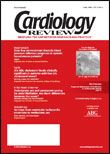The effect of diabetes on death and hospitalization in heart failure patients
In the cohort study conducted by Ahmed and colleagues, the investigators assessed whether diabetes was associated with worse outcomes in heart failure regardless of the associated risk factors and comorbidities.
Although it is well established that diabetes mellitus and heart failure share many common risk factors and comorbidities, the effect of diabetes on outcomes in heart failure remains poorly understood. Therefore, in the
cohort study conducted by Ahmed and colleagues
, the investigators assessed whether diabetes was associated with worse outcomes in heart failure regardless of the associated risk factors and comorbidities. In addition, because data regarding the sex- and age-related variation with the association of diabetes, heart failure, and outcomes are limited, the investigators also assessed whether the effect of diabetes varied by sex and whether sex-related differences vary by age.
Diabetes and heart failure are common conditions that often coexist. Diabetes is associated with increased morbidity and mortality in patients with heart failure; yet, the extent to which the poor prognosis associated with heart failure and diabetes is determined by other risk factors and comorbidity burden is unclear. It is well known that the renin-angiotensin-aldosterone and sympathetic nervous systems are uniquely activated by diabetes and heart failure, and this may be a biologically plausible mechanism for poor outcomes in these patients.
Ahmed and colleagues' study was a post-hoc analysis of the Digitalis Investigation Group (DIG) trial. In the DIG trial, 7788 chronic ambulatory heart failure subjects with either systolic or diastolic heart failure were recruited from more than 300 centers in the United States between 1991 and 1993. Most of the subjects had New York Heart Association functional class I and II heart failure and were receiving angiotensin-converting enzyme inhibitors. In the DIG trial, subjects were randomly assigned to receive either digoxin (Lanoxin) or placebo and were followed-up for a median of 38 months. Of the 7788 DIG trial participants, 2218 (28%) had diabetes. The primary outcomes of interest were all-cause mortality and all-cause hospitalization.
As an observational study, investigators performed a robust adjustment for sociodemographic and clinical factors, but, as with any observational trial, potential unmeasured confounding covariates may have limited interpretation of these results. Therefore, the investigators used propensity score matching to assemble cohorts of subjects with and without an exposure, in this case, diabetes, who would be well balanced in all other measured baseline covariates.
P
P
This study included subjects with a mean (±SD) age of 64 (±11) years; 27% of subjects were women, and 17% were nonwhites. In total, 36% of subjects died from all causes, and 69% were hospitalized for any cause during the median follow-up period of 38 months. Subjects with diabetes had a 40% rate of all-cause mortality compared with only 33% in those without diabetes (hazard ratio [HR], 1.29; 95% confidence interval [CI], 1.16-1.42; <.001). As anticipated, diabetic subjects had higher rates of hospitalization compared with subjects without diabetes (73% vs 65%, respectively; HR, 1.28; 95% CI, 1.19-1.38; <.001).
P
P
P
P
P
P
In sex-specific analyses, the relative hazard for mortality associated with diabetes was greater in women (HR, 1.73; 95% CI, 1.40-2.15; <.001) compared with men (HR, 1.17; 95% CI, 1.04-1.31; = .008). The value for interaction was highly significant at .002. Similarly, women were at greater risk for hospitalization compared with men (HR, 1.49; 95% CI, 1.29-1.72; <.001; vs HR, 1.21; 95% CI, 1.11-1.31; <.001, respectively). Again, the value for interaction was highly significant at .008. In age-specific analyses, diabetes-related death was similar between both sexes in younger subjects (6% and 8% for men and women, respectively), but was much higher in elderly women (19% and 4% for women and men, respectively).
This observational cohort study of a heterogeneous group of heart failure subjects shows that diabetes was associated with a significant increase in the risk of death and hospitalization, particularly among women, that was independent of traditional risk factors and comorbidities. Several potential mechanisms may explain this finding. Glucose and insulin resistance have important effects on cardiac structure and function and, in observational studies, sex-related differences in these effects have been noted.1-7
Although the findings are interesting, important limitations warrant discussion. Of course, as an observational study, there is always the chance that unmeasured covariates may affect the results. In this particular study, there was no central adjudication of the diagnosis of diabetes itself, and there were no data regarding the severity of diabetes, treatment of diabetes, or its control. Finally, the 1991-1993 cohort may not represent the current standard of care for either heart failure or diabetes, especially because beta blocking agents were not routinely used for the care of heart failure patients during this time. Not surprisingly, however, the presence of diabetes was associated with an increased risk of death and hospitalization in a wide spectrum of ambulatory patients with chronic heart failure regardless of other traditional risk factors.
Despite the limitations of this observational study, the findings continue to emphasize the need to apply aggressive evidence-based care to patients with diabetes in general and to those with heart failure specifically. They also emphasize the need to attend to women, especially older women with heart failure and diabetes.
